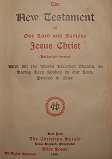|
|
|

|
|

|
Mr. KIopsch was born March 7, 1852, in Germany. In 1853 his mother died. The next year his father, Osmar KIopsch, M.D., brought him to the United States. Louis studied journalism at what is now Columbia University. He graduated with high honors. He rose from stock boy to editor with religious publishers, and by about 1889 he was the owner-editor of the American edition of the Christian Herald Magazine.
He and his father worshiped at Brooklyn Temple, where T. DeWitt Talmadge was the minister. June 19, 1899, Dr. KIopseh was writing an editorial for the Christian Herald when his eyes fell upon Luke 22:20 and the words:
"This cup is the new testament in my blood, which is shed for you."
Dr. KIopsch realized that these were the words of our Savior when he instituted the Lord's Supper. Reasoning that all blood was red, he asked himself, Why not a red letter Bible with the red words to be those of our Lord? Dr. Talmadge, his preacher, encouraged him greatly by saying: "It could do no harm, and it most certainly could do much good."
The editor besought Bible scholars in America and Europe to submit passages they regarded as spoken by Christ while on earth. (Some publishers have since expanded this feature to include all words in red spoken by Christ.)
The first printing of a red letter Bible [Copyright 1899&1900(?) by Louis Klopsch] numbered sixty thousand copies. They were printed on presses owned by Dr. KIopsch. The edition sold quickly. Presses were run day and night to supply the demand. The King of Sweden sent a congratulatory cablegram. The telegram that thrilled publisher KIopsch the most, perhaps, was one from President Theodore Roosevelt. There followed a letter on White House stationery inviting him to dine with the chief executive. He accepted.
Dr. KIopsch died March 28, 1910, and was buried at Mont Lawn near Tonawanda, New York, where he had established an orphanage. The New York Tribune said:
"He will not be easily replaced. He lived and died by his own motto:
Do All the Good You Can for All the People You Can.
This, he truly did."

NOTE: The above article on the history of the red letter edition Bible may or may not be entirely accurate. There is a red letter edition of the Bible that may have been printed prior to 1899/1900, maybe as early as 1885. Additional research is recommended.
THE HOLY BIBLE, Printed in 1611
Seeing its readings proves to cynics that the KJV's text has never been "revised" and is identical to that used today
(except for the rare 1611 typographical slips which were shortly thereafter fixed by King James translators themselves).
You can now purchase a 1611 King James Version 400th Anniversary Edition at a very low price. Published by Zondervan this is an exact, page-by-page, digitally re-mastered replica of the original 1611 printing, re-sized to a convenient 8.1 x 5.7 x 3 inches, and contains the original Old English Black Letter font. Click Here
Compare these scripture verses, John 14:16, John 16:7, I Corinthians 1:18, II Corinthians 2:15, Revelation 1:18 and Revelation 20:13,14, in modern bible versions such as the NIV and the NKJV and you will see that the KJV's superior "Comforter" has been replaced by a subordinate "helper"; and the assurance of our present salvation here and now where we "are saved" by grace through faith has been replaced by a works-based salvation where we are in the process of "being saved" by our own good works; and the word "hell" has been omitted thereby obscuring its philological meaning.
It is no coincident that new bible versions often agree with the Jehovah Witnesses New World Translation and the Roman Catholic New American Bible. For those who take the time to “[search] the scriptures daily” to “[p]rove all things”, and “search out a matter” to “try the spirits” and do their own research (Acts 17:11; I Thess. 5:21; Prov. 25:2; I John 4:1), the serpent's signature can be seen subtly weaved into the pages of new bible versions. There is overwhelming evidence exposing the nature of the unholy omissions, additions and substitutions and the spiritual forces responsible for the changes (Isa. 14:14; II Cor. 2:17; 11:14,15; Eph. 6:12; II Thess. 2:3,11; I Tim. 4:1; Rev. 13:8).